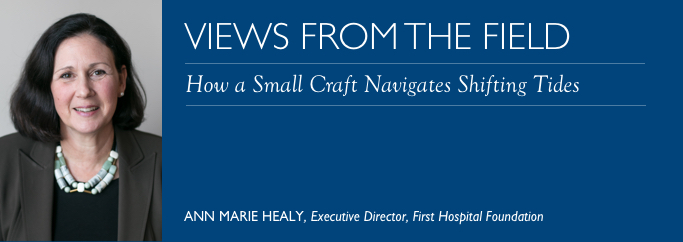
Uncertainty, confusion, anxiety, fear. With services and supports to our community’s most vulnerable residents repeatedly at risk over the last several months, we have found ourselves wondering: is this the new reality? And as a relatively small local foundation (with $45 million in assets), how can we most effectively target our resources to make a difference?
The First Hospital Foundation is a private foundation that has invested over $21 million in 156 community nonprofits over the last 20 years. Our mission is to improve the health and well-being of underserved Philadelphians by supporting access to quality care and services. We have a proud history of funding safety net organizations responding to immediate needs of communities, while also supporting policy organizations working to protect and expand gains in coverage and access.
During this past year of change and unpredictability, it has been a useful exercise to ask ourselves: what underlying dynamics and core beliefs remain the same irrespective of the current federal and state policy landscapes?
- People of all ages and backgrounds need access to flexible, high quality care and services to achieve optimal health and well-being.
- The cost of health care coverage and delivery continues to rise, too often crowding out other critical expenditures—at both the individual/family and city/state/federal levels.
- Improving health and decreasing costs requires reforming health care delivery, and addressing the social and economic disparities that shape people’s opportunities and well-being.
- Supporting integration of care and services that improves a person’s quality of life in the context of where they live requires policymakers, providers, community organizations, and individuals to work together in new and different ways.
When reflecting upon the work ahead, we come back again and again to the importance of supporting our grantees’ efforts to access and leverage diverse resources. That priority has motivated our efforts to build the capacity of organizations to demonstrate their effectiveness, while making the case to public and private funding sources (including Medicaid, hospital systems, and insurers) that organizations should receive compensation for their contributions to improving health and decreasing health care costs. The following are several examples of that work.
Unrecognized Benefits
Metropolitan Area Neighborhood Nutrition Alliance (MANNA), a well-established nonprofit distributor of medically appropriate meals, developed a hunch that consuming nutritious meals regularly had effects beyond what most of us would suspect. The hunch was that nutrition “compliance,” made possible by the dedicated work of MANNA, also decreased the frequency of medical crisis, emergency room use, and hospitalization. With our financial investment and partnership (along with others, including a local insurance company), MANNA engaged in a controlled research study designed to demonstrate the relationships. The resulting study, Food as Medicine, found that within three months of beginning to receive MANNA meals, clients’ health care costs fell significantly. When MANNA clients were compared to a control group, researchers found that their inpatient stays were shorter, hospital costs were lower, and MANNA’s clients were more than 20 percent more likely to be released from the hospital to their homes rather than long-term care facilities. That evidence allowed MANNA to contract with several regional HMOs that began paying for the organization’s meal services. The foundation helped unleash a large stream of funding for a service that over the ensuing years has helped thousands of people.
Meeting the Need
Women Against Abuse (WAA), the largest domestic violence service provider in Philadelphia, provides emergency safe havens, transitional housing, and community-based supportive services. With the foundation’s financial and human capital support, WAA established a behavioral health program at their emergency safe havens and transitional housing. With participation volume increasing, the foundation worked with WAA to acquire supplemental service status that would allow them to receive insurance reimbursement for counseling sessions. WAA is now billing for crisis, individual, group, and family behavioral health therapy sessions by a licensed therapist.
Unlikely Partners
As evidence increased that addressing social determinants of health would positively impact an individual’s overall health and well-being, the foundation made a long-term investment in the development of Medical Legal Partnerships (MLPs) in Philadelphia community health centers and hospitals. There are many barriers to effective medical treatment: social, economic, legal, and others. Health care providers are not able to address these barriers directly, but they can partner with social workers and lawyers, and together help patients (and their families) overcome those barriers. The Philadelphia legal advocates and social workers are an integral part of the health care team working to address the issues that make patients’ lives chaotic and inhibit healing: domestic violence, unsafe living conditions, child custody, debt, evictions, mortgage foreclosure, and loss of benefits. We are working with the MLP collaborative in Philadelphia to build the case to the HMOs that legal services are a key aspect of health care and therefore reimbursable.
Promoting sustainability has been a watchword for funders for years. None of us have infinite dollars and unless our grants strengthen the ability of organizations to expand and diversify their resource base, we risk placing our grantees in the position of continual dependency and constraining our own flexibility to finance new models and innovations. However, what does sustainability mean for organizations that provide critical care and services to community members who do not have the resources to pay for them?
In some cases, safety net organizations may require year after year of philanthropic funding to remain viable. I believe that part of our role is to support those organizations that help to meet the basic needs of people who our systems too often fail—while we simultaneously work to reform those very systems. In other cases, where rigorous research and data show the real contribution that integrated care and services make to improving health, the systems and institutions that benefit should bear part of the cost.
Regardless of what the federal waves may bring, the foundation will continue to partner with health care leaders, community members, and philanthropic partners to explore, inform, and inspire collective action on policies and practices that will advance health equity and the effective integration of care and services.

